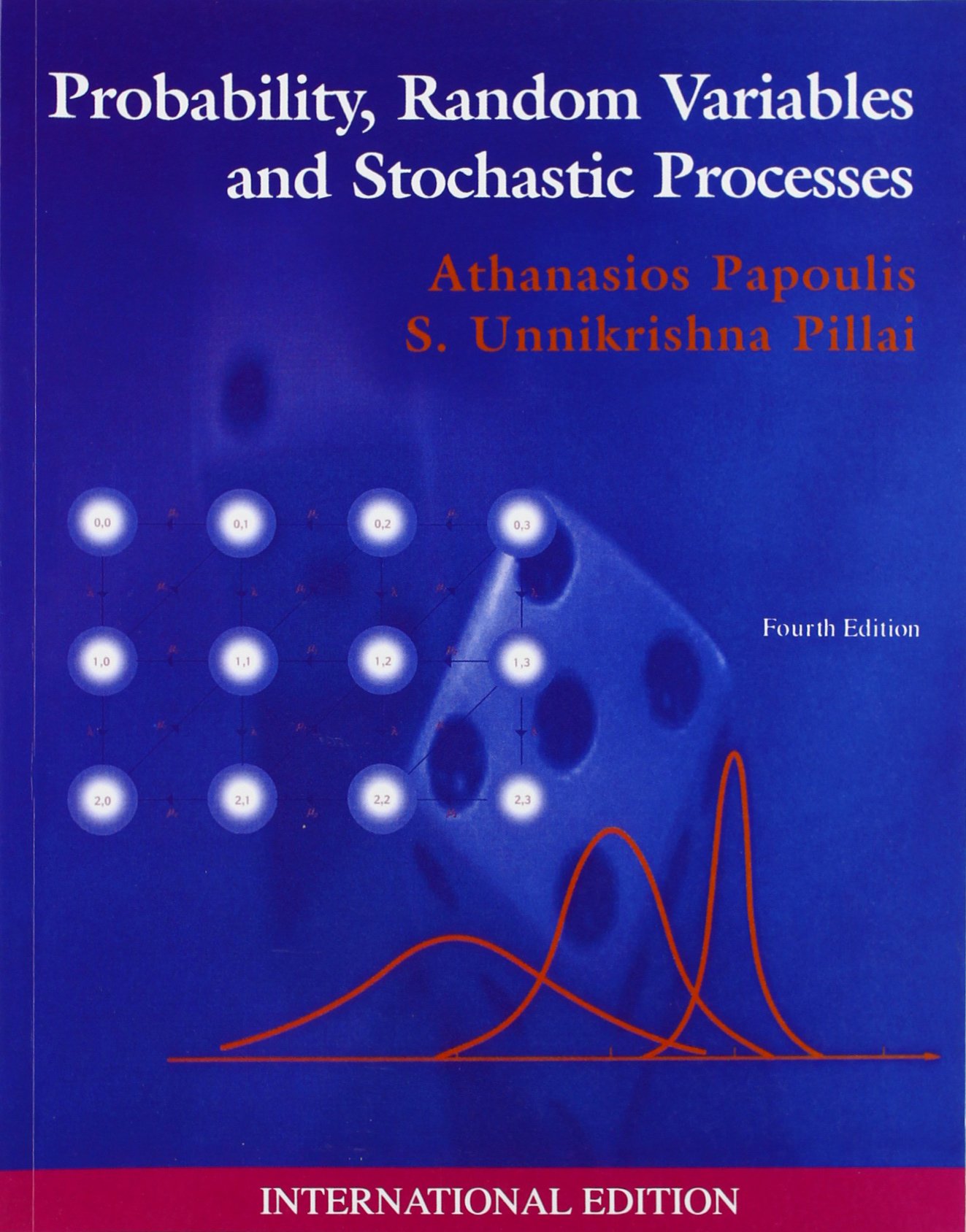



Probability, Random Variables and Stochastic Processes with Errata Sheet (Int'l Ed)
D**A
Excellent text on Random Processes
I find this an excellent textbook on random processes that covers all the basic concepts with nice illustrations. Highly recommend for Bachelor and Master students.
S**P
Classic Book on a Very Difficult Topic
I cut my teeth from the 2nd edition of this classic text and later actually went out and bought the 1st edition (1965)because multiple people that I work with mentioned that later editions were watered down compared to the original edition.I think a more accurate statement is that more applications chapters were added in latereditions (entropy, queuing theory, etc..) and the first edition is geared more toward laying out the basic underlying theory.In any case, any engineer or student working in Kalman filtering or communications would be well served byhaving a copy of this book at his/her reach. In my opinion there is never any one best book on any topic but thisbook is an element of the spanning set of books that should be consulted by engineering students/professionals on this difficult topic. Other classic books that I wouldrecommend along with Papoulis are1. Probability and Stochastic Processes for Engineers by Helstrom (written by one of the fathers of modern detection theory)2. An Introduction to Probability and Stochastic Processes by Melsa and Sage (Dover has recently reprinted this classic)Although I am not a big fan of newer textbooks the following books are the best of the more recent texts1. Ibe, "Fundamentals of Applied Probability and Random Processes" (this book is very straightforward and written for the average student; good place to start for the novice)2. Kay, "Intuitive Probability and Random Processes using MATLAB" (excellent book; best of all modern texts)3. Dolecek, Random Signals and Processes Primer with MATALB (really brings the subject to life...best used as supplementary reading)4. Jacobs, "Stochastic Processes for Physicists" (learn the Ito calculus painlessly... Book is also a good intro for engineers despite the title)
R**0
Overwhelmingly complete, difficult to search
I have studied probability and stochastic processes in undergraduate mathematics, for a brief stint as an actuary and in graduate school for electrical engineering. I found this book to be the most complete, by far, of any of the books I used and I'm sure it will become a valuable reference text. It is not, however, particularly accessible to a student who has never taken a basic course in probability or seen combinatorics/set theory, but this isn't the reason I give it 4 stars.The reason for 4 stars is that the book contains an overwhelming amount of information but is nearly unsearchable. The index is poorly designed with, for example, some concepts for the normal distribution under normal and other concepts under Gaussian. A little redundancy is sometimes very helpful in the index. In the table of contents, page numbers for the subsections are not stated. This is very difficult when the subsections are not stated at the tops of pages, chapters can be 100 pages long and declarations of the new subsections appear midway down a page in roughly the same font as "Example X" or "Theorem Y". There are also typically 200+ number equations in each chapter. I ultimately had to settle on a system of dog-earing and scratch notes for where to find key concepts.Another criticism, some of the problems are extremely difficult without identities that are proven in the text. This makes solving the problems less of an exercise in learning math and more an exercise in book skimming. There is a professor out there that put an errata and hints document online that was very helpful.
N**B
Found no substitute for a difficult subject
When readers and students ask to me for a useable book for nonmathematicians to get into probability (or a probabilistic approach to statistics), before embarking into deeper problems, I suggest this book by the Late A. Papoulis. I even recommend it to mathematicians as their training often tends to make them spend too much time on limit theorems and very little on the actual "plumbing".The treatment has no measure theory, cuts to the chase, and can be used as a desk reference. If you want measure theory, go spend some time reading Billingsley. A deep understanding of measure theory is not necessary for scientific and engineering applications; it is not necessary for those who do not want to work on theorems and technical proofs.I've notice a few complaints in the comments section by people who felt frustrated by the treatment: do not pay attention to them. Ignore them. It the subject itself that is difficult, not this book. The book, in fact, is admirable and comprehensive given the current state of the art.I am using this book as a benchmark while writing my own, but more advanced, textbook (on errors in use of statistical models). Anything derived and presented in Papoulis, I can skip. And when students ask me what they need as pre-requisite to attend my class or read my book, my answer is: Papoulis if you are a scientist, Varadhan if you are more abstract.
A**E
Good Book for Random Processes, RV, and Probability
The shipping is little slow. It ended up taking two weeks before it arrived. However, overall this is a very good book. I used it for my graduate course for advanced materials. The textbook is new as advertised. I would recommend this book to others.
Trustpilot
2 weeks ago
4 days ago